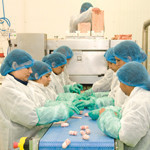
The report predicted a compound annual growth rate of 8% in European food and beverage contract manufacturing following underlying demand growth, market share gains of ‘A-brands’ and an increase in outsourcing activity.
Despite the anticipated increase, however, Rabobank said contract manufacturing will still be relatively niche in 2020, representing just 6% of the European processed food and beverages market.
Contract manufacturing is popular in a number of sectors due to its potential to lower costs, access specialist skills and benefit from the economics of scale.
Food and beverage manufacturing
While the business model is still relatively infrequent in food and beverage manufacturing, the change in production patterns to focus more heavily on outsourcing is a significant change for the industry, said Rabobank.
“In terms of the implied shift in the supply structure and the headache reduction for brand manufacturers, contract manufacturing is unmatched in its impact on the food and beverage market,” it said.
Some large food suppliers and producers already utilise contract manufacturing across Europe, such as Premier Foods and Pepsico. The model is often used by larger firms looking to expand into new markets, where production can be set up without the risk of vast financial outlay for new plants and machinery.
Rabobank pointed out that the main limiting factor hindering the growth of contract manufacturing is aligning the goals of both parties.
Outsourcing deal
“Without a balance between both parties, there is a limited incentive on either side to make a success of any outsourcing deal,” it said. “Finding this balance takes a lot of time and effort, which means that outsourcing trajectories are difficult to predict and that growth may not necessarily be linear.”
While limited in popularity at present, contract manufacturing addresses some of the key issues in food production within Europe.
Although farmland and forests account for more than 90% of land within the EU, tighter regulations focus on quality rather than quantity and the promotion of less favoured regions.
This contributes to challenges facing the food and agriculture industry, such as increased scarcity of agricultural raw materials and consolidation of food retail distribution, which contract manufacturing can help to alleviate.





